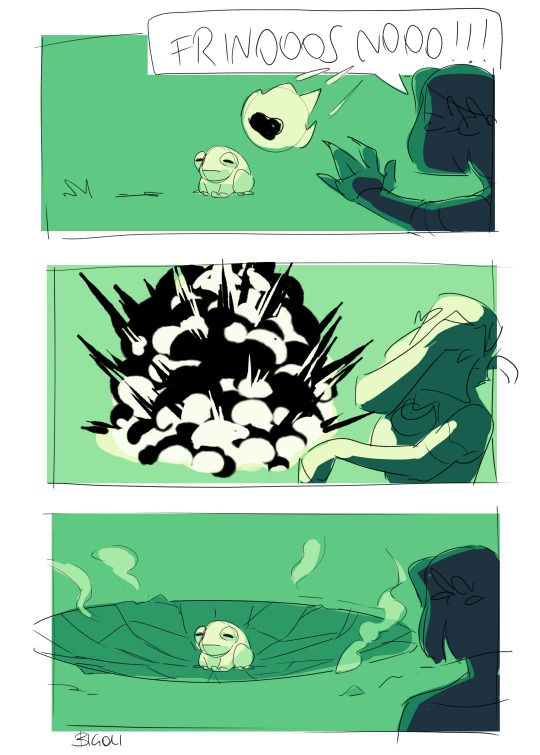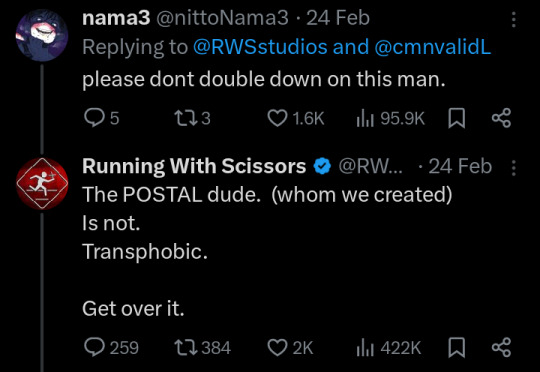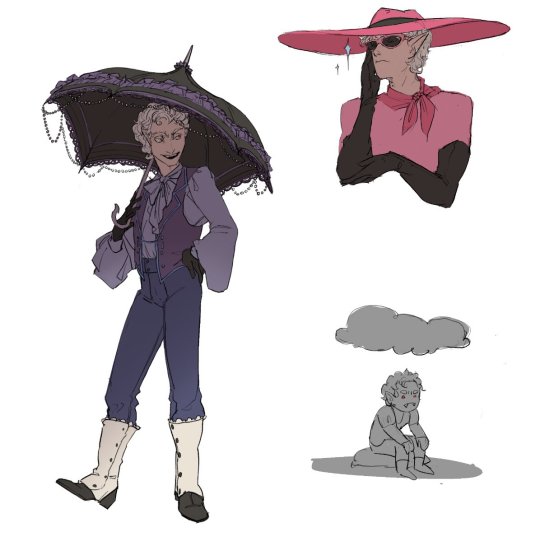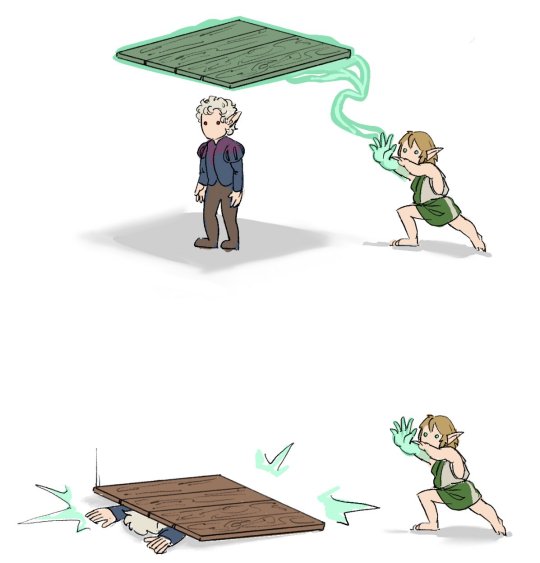#Running the game
Explore tagged Tumblr posts
Text
Letting Players Feel Smart in Combat
or, "Running Encounters with an Information Economy"
PREAMBLE: Something that frustrated me for a long time as a player in TTRPGs was how hard it could be to guess enemy tactics. There are a lot of things that you can do with good tactics, but a lot of the time you lack the information to use those tactics. For example, setting up a prepared action to counterspell just wastes your turn if nobody tries to cast anything. This can be especially frustrating when you're up first in the initiative, and don't have much more than just a description of who/what you're fighting to go off of.
AN ANECDOTE: One day I decided to try an experiment. Each round of combat was supposed to be happening in the same six seconds of elapsed time, right? So, the next time I went first, I asked my GM if I could see what the enemies were doing - everything was happening at the same time, so I should be able to read their body language, the directions they were starting to move, and where they were looking to get an idea of how they were going to act, right?
As I honestly had been expecting, my GM said no. It wasn't their turn yet, so they weren't doing anything yet. I resolved that I did not want to run my own games that way, so I came up with some ways that when I ran a game, I could help my players to not be going into battle completely blind.
THE POINT: Tipping players off to enemy tactics is just good GMing. When they get a "read" on an enemy, they'll feel like an absolute genius. When the party plans for what the enemy will do and uses tactics to put the odds in their favor, they will lose their minds over how cool they feel. Here's a couple things I do to make that happen.
The first is giving enemies tells for what they're planning, which sounds simple, but actually requires a change to how encounters are typically run. Basically, you should know what an enemy will do before their turn, and typically at the end of the last one. Then you narrate them doing something to hint at that as part of their action. For example, a dragon might inhale deeply before using its breath weapon, or a manticore might slowly go from lashing its tail from side to side to holding it stiff as it prepares to launch a volley of spikes.
You don't have to stay committed to a course of action once you've given a tell, but if the players do something that would cause an enemy to reconsider its tactics (or determine them, if you hadn't decided anything for it yet), that's another time to give a tell. For instance, you might have already described a dire wolf lowering on its haunches as it starts stalking toward the ranger, ready to pounce, when the halfling rogue stops taking cover behind the fighter. In that case, you might describe the dire wolf shifting its stance, licking its lips as it turns its attention to this weaker-looking prey.
There's no need to give a tell for every action, of course. That would get taxing for you, and tedious for the party. Generously sprinkling in clues as to key things enemies want to do can keep players engaged, and help them break through the indecision about what to do with their own turns, though.
That brings me to my other trick. If you read the anecdote section above, this is something I came up with as a direct result of that. I decided to add a special action type that is just for the players, the "Observe Action". Every player gets one Observe Action on each of their turns that they can use in a number of ways to get more information about the conditions on the battlefield, or to gain an advantage.
The first use is just applying their skills in the normal way. If they could use a skill to recall information about a particular creature, they now do this as an Observe Action. This one is technically an explicit nerf in Pathfinder, since recalling is stated to be no action, but I find that most groups only check on one monster at a time anyway, and on the occasions when they don't, starting combat with check spam just slows the action down, so I include it. It usually doesn't hurt anything, and having it on the list can actually remind players that doing this is a thing they can do in the first place.
The second is also more or less a bookkeeping task, and that's using informational magic, like the Detect spells. It doesn't change the cast time, but once the spell is up, any further focus to gain more information uses their Observe Action. This is mostly just to remind players they can have these going while they fight, but I do also make any part of using the spell once cast that would normally be a Standard Action into an Observe instead, as a small bonus.
The third use, and the first truly new option, is to "read" a group. This is similar to recalling information, but allows for some different questions to be asked. Use these as a baseline.
Who has the highest/lowest HP?
Who can deal the most damage with physical attacks.
Who has the highest bonus to hit?
General "lean" of the group's alignment. (Most common alignment component on a single axis.)
How challenging does this fight look? (General CR range of the encounter, described as Easy, Average, Challenging, etc...)
Individual with the highest/lowest value in a particular ability score.
Highest/lowest value in a particular saving throw.
Basically, this option is there to help players decide who to focus their attention on. Let them use it for whatever will help them get a better idea of who or what they're facing. Let them ask their main question up-front before rolling to establish the check (whatever skill and DC seems appropriate), but let them ask additional questions after if they get a high roll.
It goes hand in hand with the last option, which is gauging intent. This one should probably be done with Insight/Sense Motive, and it just comes down to that original question. What's going to happen next?
The first way this can work is that the player focuses on a specific enemy, and gets a sense of what that enemy specifically intends to do. In other words, the player tells you who they want to get a "tell" for, and if they succeed, you give it to them.
Alternatively, the player might ask if anyone in the enemy group is about to take a specific action. For example, "Is the cleric about to get targeted." or "Does anyone look like they're going to call for backup?" So basically, instead of focusing on the behavior of one individual, the player is staying alert for a particular situation. Don't let the players get too broad with this one, of course, but it's okay to be a little generous with what they can ask about.
Even more than when I advised it above, if someone successfully gauges the intent of their enemy, and that intent changes, let them know. You should treat a success as them continuing to be alert to what they were observing for until their next turn.
I also toyed with the idea of letting players use their Observation to look for openings to improve their chance of hitting, or for a weak spot to do more damage. I like the idea of this, but felt like it stepped on the toes of other, existing options too much, and would be too tempting to players over the other uses. So I decided to keep Observation Actions as purely a source of information, and not directly pumping numbers. Still, if it sounds like it would work for you, try it out.
For everyone who read this incredibly long post of mine, I hope it helps you out. I haven't done a post like this in a long time, and I really appreciate you taking the time to read it. If these rules improve anyone else's games, hearing that would really make my day.
#ttrpg#tabletop roleplaying#dungeons & dragons#pathfinder#game mastery#running the game#encounter design#roleplaying games#game master advice#house rules#long post#essay#homebrew#this is just what works for me
86 notes
·
View notes
Text
Because I like to engage my players in the world via collaborative worldbuilding exercises, I like to let players be a guide to their own PC's hometowns when we arrive there, and ask them questions such as how the locals prefer to top their hot dogs.
Because I am an incorrigible gremlin and this game is free, they are not called hot dogs in my setting, but warm douglases.
14 notes
·
View notes
Text
*reads a wikihow on how to sail a boat just so I can make a skill challenge out of it for my D&D game*
51 notes
·
View notes
Text
A perfect setting for a modern rpg. Easy to see how you would use it as a GM: the PCs need something from the lowest level of the mine. Is the threat just the probably toxic water and a likely eminent collapse? Is it the pitch black water making navigation difficult as their oxygen supply burns down? Or is there something else down there with them?

Stairs down to the flooded level deep inside a mine.
33K notes
·
View notes
Text
DM guide: Running the Game: Resolving Outcomes Part: 2
Advantage and Disadvantage: Advantage and Disadvantage are among the most useful tools in your toolboxx. They reflect temporary circumstances that might affect the chances of a character succeeding at a task. Advantage is also a great way to reward a player who shows exceptional creativity in play. Characters often gain Advantage or Disadvantage through the use of special abilities actions spells or other features of their classes or species. In other cases you decide whether a circumstance would merit Advantage or Disadvantage.
Advantage: Consider granting Advantage when:
Circumstances not related to a creature's own capabilities provide it with an edge.
Some aspect of the environment improves the character's chance of succeess.
A player shows exceptional creativity or cunning in attempting or describing a task.
Previous actions improve the chances of success.
Disadvantage: Consider imposing Diadvantage when
Circumstances hinder success in some way.
Some aspect of the environment makes success less likely.
An element of the plan or description of an action makes success less likely.
Consequences: As a DM you can use a variety of approaches when adjudicating success and failure to tailor the game to your liking.
Success at a cost: When a character fails a D20 test by only 1 or 2 you can offer to let the character succeed at the cost of a complication or hinderance. Such complications can run along any of the following lines:
A character gets her sword past an enemy's defenses and turns a near miss into a hit but she then drops the sword. A character narrowly escapes the full brunt of Fireball but is Prone. A character fails to intimidate a Kobold prisoner but the Kobold reveals its secrets anyway while shrieking at the top of its lungs alerting other nearby monsters.
By putting the choice of success at a cost in the players hands and even letting them choose the setbacks you can give players more agency in crafting the story of their character's deeds.
Degrees of Failure: Sometimes a failed d20 test has different consequences depending on the degree of failure. For example a character who fails to disarm a trapped chest might accidentally spring the trap if the check fails by 5 or more whereas a lesser failure means the trap wasn't triggered during the botched disarm attempt. Consider adding similar distinctions other checks. Perhaps a failed Charisma (Persuasion) check means a queen won't help whereas a failure of 5 or more means she throws the character in the dungeon for such a display of impudence.
Degrees of Success: A successful D20 test can have degrees of success. For example, when characters participate in an archery contest you might decide that the more an attack roll exceeds the target's AC the higher the character's score. The archery target might have AC11, but it has 5 concentric rings indicating degrees of success. So, you could decide that an attack roll of 11 or 12 lands in the outermost ring 13 or 14 hits the next ring closer to the center a 15 or 16 hits the third 17 or 18 hits the fourth and a 19 or higher strikes the bull's eye.
Critical Success or Failure: Rolling a 20 or a 1 on an ability check or a saving throw doesn't normally have any special effect. However you can take such an exceptional roll into account when adjudicating the outcome. It's up to you to determine how this manifests in the game. One approach is to increase the impact of the success or failure. For example rolling a 1 on a failed attempt to pick a lock might jam the lock and rolling a 20 on a successful Intelligence (Investigation) check might reveal an extra clue. For attack rools the rules cover what happens on a nat 20 or a nat 1, Resist the temptation to add additional negative consequences to a nat 1 on a attack roll the automatic failure is bad enough. And characters typically make so many attack rolls that they're bound to roll dozens of nat 1s over time. What might seem like an interesting consequence like breaking the weapon used for the attack will quickly get tiresome.
Improvising Answers: With a little preparation and a lot of flexibility you can handle any curveball your players throw at you. One of the cornerstones of improvisational theater is called "Yes and..." It's based on the idea that an actor takes whatever the other actors give and builds on that. A similar principle applies as you run sessions for your players. As often as possible weave what the players give you into your story. An equally important principle is "No but..." Sometimes characters can't do what their players want but you can keep the game moving forward by offering an alternative. For example imagine the characters are searching for a Lich's lair. A player asks you if there's a mages guild operating in a nearby ciry hoping to find records that mention the Lich. This wasn't a possibility you anticipated and you don't have anything prepared for it. One option is to say yes and use the tools at your disposal to create a suitable mages guild. By doing This your reward the player for thinking creatively. Also the guild can become a great source for adventure hooks. Another option is to say no but a solitary mage in town might possess the desired information. This approach rewards the creative player while demanding less work from you.
#dm guild#running the game#resolving outcomes#advantage and disadvantage#consequences#improvising answers
0 notes
Text
You know I used to think "tumblr's absolute refusal to actually engage with the Trolley Problem in favor of insisting that there must be a third, morally pure option that doesn't require them to make a hard decision and anyone who asks them to make a binary choice is just a short-sighted idiot is really fucking annoying, but I guess it's not actually doing any harm".
Anyway that was before we asked tumblr at large to decide between "guy aiding a genocide but making progress elsewhere" and "guy who would actively and enthusiastically participate in a genocide and would also make everything else much, much worse for everyone elsewhere" and the response was that there must be a third, morally pure option that doesn't require them to make a hard decision and that anyone who asks them to make a binary choice is a short-sighted idiot.
#there is not a third option. it is either trump OR biden#and one of those will be much MUCH worse for palestine#i'm really really sorry that these are the options. i wish they weren't.#but WHAT third option are you trying to take here? what on earth is your proposed outcome#that will actually make things better for palestine?#because letting trump win the election is NOT going to help them#i'm sorry but you need to set aside your feelings and take the option that will lead to less harm to palestine in the long run#you talk such a big game about how people need to be willing to make sacrifices to help palestine#but you yourself aren't even willing to hold your nose and vote to stop things from getting worse?#or did you think 'sacrifice' only meant not getting mcdonalds for a few months?#us politics
22K notes
·
View notes
Text
I am a solo indie dev trying to overcome my anxiety and actually let people know my game exists. It is a cute physics based game where you are the level.
I love making this game with passion and I am so excited to share it with the world, but somehow I need to let the world know. Unfortunately the way steam works is the more wishlists the more visibility, so if you are interested it is super appreciated :)
Wishlist on steam or visit the website to find out more mightymarbles.com
#video games#gamedev#indie games#indiedev#unity3d#game development#indiegamedev#puzzle#puzzle games#rube goldberg#mini golf#marble run#marbles
33K notes
·
View notes
Text



WWDITS / BG3 crossover
#astarion#astarion bg3#bg3#wwdits#meme#baldurs gate 3#why would the goblins have a wooden traffic cone?#for fun#maybe for the chicken run game they have#idk
43K notes
·
View notes
Text
noone:
that one teammate who got the charger on a griller wave:

#yes this is a smiling friends reference#i have witnessed too many horrors in this game#splatoon 3#splatoon#salmon run
7K notes
·
View notes
Text

i love frinos
#my art#he's the best he gives me strength on bad runs#i dont even need him to cover me im just happy hes here#frinos#melinoe#hades 2#hades ii#hades game#hades#hades supergiant#hades 2 spoilers
9K notes
·
View notes
Text
gm trick - the Critical Information roll
sometimes, there's important info that you don't want your players to miss. maybe a scene won't make sense without it, or maybe the game will stall. but maybe you don't just want to say "everyone knows this" either, or it would feel cheap to just tell someone they know something.
simply have everyone roll. then, regardless of outcome, tell the highest roller(s) what you need them to know. maybe a little more or less, depending on if they did well, but always including the most important detail. instead of rolling for if anyone knows, you're just rolling to see who knows.
so what do you do if everyone rolls really crap? like what if they all get a 5, or worse a 1? simply frame it as unreliable knowledge with a nugget of truth. "you've all heard rumors, and some say X, and others Y, but what they all seem to agree on is Z."
doing this will keep the game moving forward, and still make the players feel like their skills mattered.
12 notes
·
View notes
Text
Every once in awhile I'll remember Running With Scissors responding to a transphobic gimmick account on Twitter and my day will instantly get ten times better


8K notes
·
View notes
Text
when you’ve made the best court intrigue adventure that you can and it’s full of NPC interaction and politics and you really think you’ve popped off with the writing this time but then you know you can’t act for shit and can’t do voices so the execution is gonna be a dog show
31 notes
·
View notes
Text



A @corviiids tweet that is very important to me 🙏 I'm always thinking about spawn Astarion how he loves the sun
#i am spending am unhealthy amount of time thinking about hcs of my durge and astarion going on cute adventures after the game#if you shitpost to my very particular niche vibe you are my muse i cant explain it#is hot spring running water? i think Astarion deserves to have a hot spring vacation#bg3#baldurs gate 3#Astarion#alibonbonn#corviiids#alidraws
16K notes
·
View notes
Text
Perception Check: Clues and Information
Welcome to a new series called Perception Check where I will be breaking down answers from many Dungeon Masters on how they handle various parts of running the game. This entry discusses clues and information.
Welcome to a new series called Perception Check where I will be breaking down answers from many Dungeon Masters on how they handle various parts of running the game. Over on Threads, I ask a daily question and usually, I get many amazing answers from dungeon and game masters all over. Here I will be presenting answers to a question along with some data analysis and personal insights. How do you…
View On WordPress
#clues#d20#dnd#dnd5e#dungeon master#dungeons and dragons#game master#perception check#running the game#secrets and clues#threads#ttrpg
1 note
·
View note